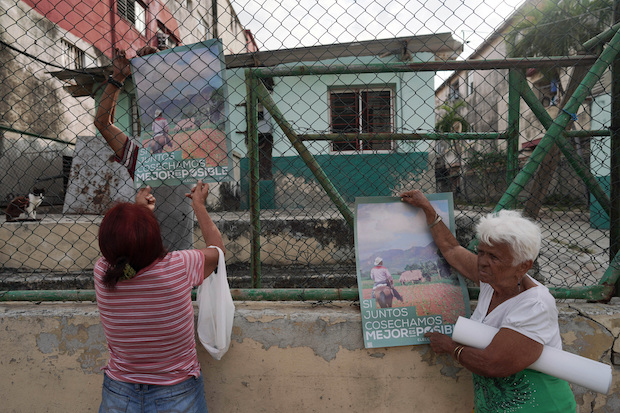Cubans head to the polls, all eyes on voter turnout

People hang signs announcing the upcoming legislative elections in Havana, Cuba, March 25, 2023. (Photo by ALEXANDRE MENEGHINI / Reuters)
HAVANA — Cubans began voting early on Sunday for the 470 lawmakers who will represent them in the country’s National Assembly in a closely watched election seen as a referendum on the communist-run government at a time of deep economic crisis.
Voting centers in the capital Havana opened at 7 a.m. ET and bustled with activity as citizens arrived to cast ballots at the city’s share of more than 23,000 official ballot sites throughout the country.
Cuba’s government, saddled by shortages, inflation, and growing social unrest, has encouraged unity in Sunday’s vote, calling on citizens to vote together in a broad show of support for the communist leadership.
Ana Lydia Velazquez, a 78-year-old retired Havana resident, told Reuters that message resonated with her.
“I believe all Cubans should go to vote, to help our country improve, and advance,” she said. “We are going through a critical situation and we all have to pitch in.”
Article continues after this advertisementAnti-government forces, primarily off-island in a country that restricts dissident political speech, have encouraged the opposite, calling on Cubans to abstain and labeling the election a “farce.”
Article continues after this advertisementCuban President Miguel Diaz-Canel, who voted in his hometown of Santa Clara just after sunrise on Sunday, said the people would have the last word.
“Some people may put the difficult economic situation ahead of their willingness to vote, but I don´t think it will be a majority,” Diaz-Canel told reporters.
The 470 candidates on Sunday’s paper ballot are vying for 470 open seats. There are no opposition candidates.
A high rate of abstention would not have any immediate impact on the election’s outcome, as the winners of the contest must receive more than half the votes of those who choose to cast ballots.
But political analysts say a low rate of participation in the elections would be a sign of deepening discontent with Cuba’s one-party, communist-run system. Abstention has been on the rise in Cuba over several elections.
The winning 470 candidates, who serve for five years, will choose the next president of Cuba from among their ranks, further raising the stakes of Sunday’s vote.
Voting closes at 6 p.m. ET (2200 GMT). Results are expected early next week.
Cuba does not allow independent international observers to oversee the country’s elections.